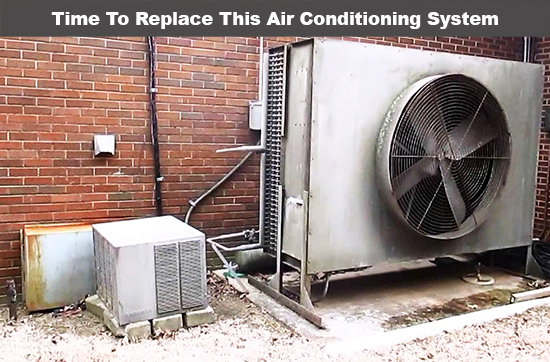It’s certainly understandable that most homeowners do not want to incur the expense of replacing an air conditioning system before it becomes absolutely necessary. However, determining when is the best time to replace an air conditioner might be a little more complicated than one would guess; at least without a little further investigative research. For example, replacing an aging air conditioner can have a number of advantages. Many of these directly related to helping you save money.
Cost Of Postponing A New AC System
You might think that you are saving money by putting off the installation of a new air conditioner. However, chances are it’s actually costing you quite a bit. Today’s high-efficiency air conditioning systems can dramatically reduce energy usage, thereby lowering your monthly cooling bills.
Additionally, as an air conditioner ages, it naturally loses its effectiveness and efficiency. You’ll almost always pay much more to operate your old air conditioning system than you will a new AC replacement.
Of course, it’s not just the higher cooling bills that make your old air conditioner more expensive. An aging air conditioner is also at a much higher risk for mechanical breakdowns. This generally means you’ll eventually be facing expensive service calls. Unfortunately, these inconvenient breakdowns typically happen right when you need your cooling system the most.

The harder your air conditioner is working to beat the heat, the more likely that it will experience a breakdown. In this case, you have to deal with a hot home until you can get a service technician to fix the problem. Emergency repairs can be expensive. The replacement parts needed to get your air conditioner running again may also be expensive.
Want to schedule a consultation with PFO to discuss your current cooling needs?

Aging AC Systems Contribute To Health Problems
An aging air conditioner can also contribute to health problems. As your air conditioner gets older, it is more likely to spread harmful microorganisms. An air conditioner offers the perfect breeding ground for bacteria and fungi; it’s also the perfect place for pollen and other allergens to accumulate.
An air conditioner that is circulating bacteria and other pollutants into your home can exacerbate respiratory problems. For example, increasing the frequency and severity of bronchitis and asthma attacks. Additionally, the overall health problems associated with allergies and poor indoor air quality can be increased.
While there are certain things a homeowner can do to help get the most out of their air conditioner, even regular maintenance, and timely repairs will eventually not be enough. Keeping your air conditioner clean and making sure that it is properly tuned up can definitely help extend the life expectancy; however, even the best air conditioner should be replaced when it begins to show signs of trouble.
Here is a video that discusses the installation of a Carrier heat pump. A heat pump cools a home like an air conditioner. It is also capable of heating the home in the winter.
With a new air conditioner, you’ll get more energy efficiency. You’ll also provide a better indoor environment for your family. As an added bonus, you’ll also be able to sit back and relax without worrying about when your next air conditioning problem is going to disrupt your day. A new air conditioner is also much better for the environment, offering a greener way to keep your home cool during the hottest days of summer.
PFO Heating & Air Conditioning can help you with your decision to replace or repair your home’s central air conditioning. We service all brands of systems and install Carrier and Mitsubishi cooling systems. Our Home Comfort advisors will find the best solution for you and your family.




